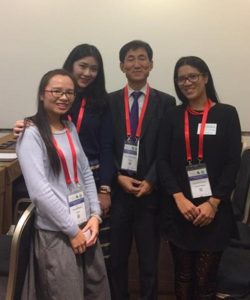Interview with Maria Veronica Chang, candidate for Master of Environmental Management at Yale School of Forestry and Environmental Studies and participant of IUFRO-SPDC’s Pre-Congress Training Workshop on “Systematic Review in Forest Science – Learning from Traditional Forest Knowledge”.
Please introduce yourself briefly.

Participants of Pre-Congress Trainings Course. Photo: provided by Veronica Chang (right)
My name is Maria Veronica Chang, candidate for Master of Environmental Management at Yale School of Forestry and Environmental Studies. I have a keen interest in community based tropical forest restoration, particularly in the Neotropics. I am a native of Guayaquil, Ecuador, and I hold a B.S. in Agricultural Economics. Prior to my arrival at Yale, I worked as an environmental educator at Cerro Blanco Tropical Dry Forest in Guayaquil, and as a manager of a sustainable farm in the coast of Manabi, Ecuador. At Yale F&ES, I’m focusing my studies and specialization in tropical forests restoration and management. Additionally, I’m contributing to Yale ISTF (International Society of Tropical Foresters) as treasurer, and as a research assistant for the Map of Life Project. For my master’s project, I conducted my research and work in Azuero, Panama, measuring Agroforestry and Conventional restored plantations in degraded cattle-ranching landscapes. My research will assess the potential of forest restoration programs to incentivize landowners into adopting carbon sequestration systems and improving landscape management practices.
How did you learn about this workshop?
I learned about the workshop through the IUFRO webpage while I was registering for the congress.
Is this the first time for you that you take part in an IUFRO event?
Yes.
Why did you want to participate in this workshop?
My previous research will support local farmers providing data that will help them to adopt sustainable management decisions. However, as a researcher, I think it is important not only to investigate urgent environmental problems and potential solutions. It is also essential to learn the tools to effectively inform scientific findings that would influence the policy decision-making process and therefore, secure the wellbeing of the communities in the long-term.
What do you hope to gain from this workshop?
I hope to gain skills and expertise in conducting future systematic review work concerning relevant forestry and environmental issues. I think there is a great opportunity to get involved and help to establish evidence-based framework that could be used for policy and future environmental agreements.
Would you recommend this workshop to your colleagues?
Definitely, yes!
Thank you for this interview!
Additional information: http://www.iufro.org/science/special/spdc/actproj/twsbeijing16/
Blog post: https://blog.iufro.org/2016/10/23/systematic-review-in-forest-science-learning-from-traditional-forest-knowledge/
Photo:
from left to right:
Minghui Zhang (Seoul National University), Yinghe Huang (Renmin University of China), Prof. Youn Yeo-Chang (Seoul National University), and Veronica Chang (Yale University) during the TFK Session at IUFRO AO 2016 Congress, Beijing

Leave a Reply